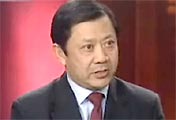Same old Putin, same old politics?
- By Ji Zhiye
 0 Comment(s)
0 Comment(s) Print
Print E-mail China.org.cn, March 6, 2012
E-mail China.org.cn, March 6, 2012
|
 |
|
Ji Zhiye is the Executive Vice President of the China Institutes of Contemporary International Relations. |
I do not hold with the prevailing view that Vladimir Putin's reelection as Russia's president will see him take continued tough measures against the US. I am doubtful because President Putin faces a different situation now.
Current and future global geopolitics are very much in Russia's favor, given NATO's inability to extend any further eastwards. Ukraine has passed a law stating that it will not form alliances with any military groups. In addition, Russia and Ukraine have signed a deal to extend the lease term of Sevastopol to 2049. As a result, Ukraine cannot join NATO, as NATO regulations preclude members from hosting the military bases and forces of any third party.
Georgia is also unable to join NATO. The reason for this is that Russia is one of five countries which, following the Russia-Georgia conflict, backs the independence of two breakaway Georgian regions, Abkhazia and South Ossetia. Meanwhile, NATO member countries must ensure their territorial integrity and refrain from engaging in territorial disputes with a third party. Therefore, Georgia cannot join NATO unless it gives up Abkhazia and South Ossetia, or NATO changes its rules.
In the future, President Putin's strategic military pressure in the West will recede. The other pressure from the West is that the eastward expansion of the EU will squeeze Russia's strategic economic maneuverability. However, Russia may face less pressure from the EU, as the EU will likely focus on economic rebuilding and improving its internal cohesion.
|
Don't miss: |
|
? Former ambassador: Putin's win in line with public opinion |
As a result, the only problem facing Russia is the US' global anti-missile system, to which Russia is firmly opposed. Russia had requested the setting up of a joint missile system with the US in order to crack down on terrorism. However, I believe that Russia is the US' real target.
The main pressure facing eastern Russia is the contradiction between China and the US. Now Russia is hiding behind China, and the Sino-US contradiction has become the major contradiction. As a result, the global situation is comparatively favorable for Russia, and certainly better than it is for China.
Russia is faced with the important task of integrating the countries of the Commonwealth of Independent States (CIS). In an article written by Putin during his reelection campaign, he mentioned the establishment of a Eurasian Union, which is also part of his diplomatic strategy. This shows that his future diplomacy will focus on integrating these countries in order to build the Eurasian?Union based on economic integration. In fact, some initiatives have already been taken in this regard. For example, the Customs Union of Belarus, Kazakhstan and Russia was launched in early 2011; in the same year, six CIS countries signed a free-trade zone agreement. The idea of a?Eurasian Union has, therefore, been put into effect in terms of economics.
In military terms, the role of the CIS' Collective Security Treaty Organization (CSTO) was further strengthened last year. It aims to safeguard common boundaries and address domestic terrorism and unrest. These are all steps towards establishing a Eurasian Union. These initiatives reflect Putin's changing diplomatic strategy, which shows Russia's desire to once again become a global power.
What are the contradictions between Russia and the US? First, the US is critical of the problems inherent in Russia's development process, such as dictatorship and undemocratic rule, which is a long-lasting contradiction between the two countries.
The second is the expansion of the US's influence in Central Asia and the CIS region, especially the military cooperation between the US and these countries and the issue of military bases. However, Russia is not able to directly confront the US in this regard. All Russia can do is try to persuade those countries to reduce their level of cooperation with the US military.
The future of Afghanistan may bring a third contradiction to Russia-US relations. Despite the fact that the US army has pulled out of Afghanistan, it retains military bases and maintains a hand on the reins of power there. However, the reduction of the US army's presence will lead to an increase in the drug smuggling trade, as well as and transnational crimes in Afghanistan. This is a tough issue which Russia must deal with. Central Asian countries desire peace, and look to Russia for help and support, and most likely from the US also. Therefore, Russia and the US may also clash on this issue.
When talking about Sino-Russia relations, we must also mention China's current position as the number two global economic power. China's growing stature means that it should take greater responsibility for global issues and their solutions. In this regard, China's situation is globally unfavorable compared with Russia's.
Therefore, in terms of many international issues, China expects support and coordinated action from Russia. During these past years, the two countries have established a close relationship based on cooperation, which will continue in the future. Despite some disagreements, China and Russia are heading in the same direction in terms of globalization. As a result, cooperation and coordination are the key foundations on which the future development of both countries will be built.
This article was first written in Chinese and translated by Xu Lin.
Opinion articles reflect the views of their authors, not necessarily those of China.org.cn.





